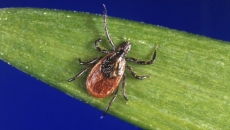An expert panel of doctors and researchers say Canada needs to learn from the COVID-19 pandemic and take action before the next health emergency strikes.
One of the six experts, Dr. Fahad Razak, says most scientists believe it's "only a matter of time" before another global health crisis hits.
The panel's report, called "The Time to Act is Now," says disease surveillance, hospitalization data and research findings need to be communicated much more effectively between the provinces, the territories and the federal government.
PM Trudeau said during his testimony at the foreign interference inquiry that he has the names of several current and former Conservative officials involved in foreign interference and wants the leader to get clearance to address this. #cdnpoli pic.twitter.com/5qT4ZYjPnm
— Sarbraj Singh Kahlon (@sarbrajskahlon) October 16, 2024
Razak, an internal medicine specialist at St. Michael's Hospital in Toronto, says it's critical to share evolving health information much more quickly with the public to build trust and combat the spread of disinformation.
The report says Canada also needs to address inequities among people who are hardest hit during emergencies, including people who are racialized, Indigenous communities, people who are homeless and residents of long-term care homes.
It says more investment in research on how to better prioritize and support these groups, including addressing underlying health needs, is necessary.
Canada also needs to create a single, permanent scientific advisory group — something that's been done in the U.K.— instead of trying to pull together that expertise in the middle of an epidemic, said Razak, who was the scientific director of the Ontario COVID-19 Science Advisory Table.
"There's only so much that you can do in the middle of a crisis. People are desperate, infrastructure does not work as well when there's a crisis," he said in an interview on Tuesday.
"A lot of what we saw globally when we compared (pandemic) responses suggests that the preparedness is the critical part.”
The report said the "absence of pre-existing emergency protocols for science advice in Canada caused significant delays" and better co-ordination was needed "within and across all levels of government."
Having scientific advisory groups federally and provincially communicating separately "resulted in multiple streams of advice," said the report, which was released on Friday.
The report by the independent panel of experts was requested by Health Canada.
Razak said there were some aspects of Canada's handling of the COVID-19 pandemic to be proud of, including using wastewater surveillance to detect how much of the virus was present in communities.
"We were one of the pioneering countries and we certainly advanced it at scale beyond what many other countries were able to achieve," he said.
But some provinces, including Ontario, have now made significant cuts to their wastewater surveillance programs, leaving many communities with "almost no data," Razak said.






